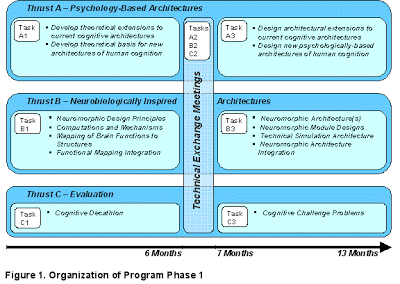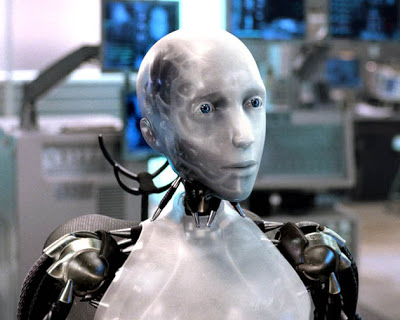Neuroscience
The failed prequel to DARPA's Physical intelligence (PI) Program?



- Artificial Brain Parts
From Sensopac, who've announced plans to build an artificial cerebellum for robots: Breakthroughs and Innovations at a Glance: + Developing a theoretical understanding of the basis of cognition + Building a machine that can explore its own environment...
- Computational Vision
The new study A Feedforward Architecture Accounts for Rapid Categorization, Serre, T., A. Oliva and T. Poggio, PNAS 2007, in press [not online yet] reveals the success of a computational version of vision modeled on the visual cortex processes of immediate...
- Darpa Allocates $70 Million For Improving Deep Brain Stimulation Technology
In what appears to be an exclusive story, the New York Times has reported that the Defense Advanced Research Projects Agency (DARPA) will spend $70 million over the next 5 years to further develop and improve deep brain stimulation (DBS) techniques....
- Darpa's Physical Intelligence Program
Physical intelligence (PI) Colossus - The Forbin Project takes place in the 50s during the height of the cold war. Dr. Charles Forbin, a genius scientist who has lost trust in humanity’s ability to logically address emotional issues, has developed...
- Paid Summer Internship - The Wediko Summer Program
The Wediko Summer Program is a short term residential treatment program that serves approximately 150 children with emotional and behavioral difficulties each summer. Each year, we hire a group of dedicated, ambitious, and talented individuals to make...
Neuroscience
Biologically-Inspired Cognitive Architectures (BICA)
The failed prequel to DARPA's Physical intelligence (PI) Program?

BIOLOGICALLY-INSPIRED COGNITIVE ARCHITECTURES (BICA)1 Program Objective The goal of the Biologically-Inspired Cognitive Architectures Program via this BAA is to develop, implement and evaluate psychologically-based and neurobiologically-based theories, design principles, and architectures of human cognition. In a subsequent phase, the program has the ultimate goal of implementing computational models of human cognition that could eventually be used to simulate human behavior and approach human cognitive performance in a wide range of situations.Two anonymous commenters on my previous post about the PI Program at DARPA (Defense Advanced Research Projects Agency) noted the existence of an earlier program that never got off the ground. Neither commenter had particularly fond memories, likening it to a Survivor-like battle between huge alpha male egos out for a money grab.

Mission:The goal of the BICA program was to develop integrated psychologically-based and neurobiology-based cognitive architectures that can simulate human cognition in a variety of situations.Wikipedia says that:
The second phase (Implementation) of BICA was set to begin in the spring of 2007, and would have involved the actual construction of new intelligent agents that live and behave in a virtual environment. However, this phase was canceled by DARPA, reportedly because it was seen as being too ambitious.How ambitious? For example, APPENDIX ONE: Functional Primitives of the Human Brain (An Initial List) (keep scrolling) is a modest list of 400 or so cognitive, linguistic, social, emotional, sensory, and motor functions that range from imprinting to combinatorial creativity to gustatory learning to frustration. How many of these could be incorporated into a model of human cognition??
Under Task 1, developers will produce psychologically-based theories of cognition covering as broad a range of cognitive activities as possible.In the end, it became clear that the whole idea was unfeasible. DARPA was not deterred by that experience, however, because the Physical Intelligence Project seems even more ambitious, with the following goal:
If successful, the program would launch a revolution of understanding across many fields of human endeavor, demonstrate the first intelligence engineered from first principles, create new classes of electronic, computational, and chemical systems, and create tools to engineer intelligent systems that match the problem/environment in which they will exist.

- Artificial Brain Parts
From Sensopac, who've announced plans to build an artificial cerebellum for robots: Breakthroughs and Innovations at a Glance: + Developing a theoretical understanding of the basis of cognition + Building a machine that can explore its own environment...
- Computational Vision
The new study A Feedforward Architecture Accounts for Rapid Categorization, Serre, T., A. Oliva and T. Poggio, PNAS 2007, in press [not online yet] reveals the success of a computational version of vision modeled on the visual cortex processes of immediate...
- Darpa Allocates $70 Million For Improving Deep Brain Stimulation Technology
In what appears to be an exclusive story, the New York Times has reported that the Defense Advanced Research Projects Agency (DARPA) will spend $70 million over the next 5 years to further develop and improve deep brain stimulation (DBS) techniques....
- Darpa's Physical Intelligence Program
Physical intelligence (PI) Colossus - The Forbin Project takes place in the 50s during the height of the cold war. Dr. Charles Forbin, a genius scientist who has lost trust in humanity’s ability to logically address emotional issues, has developed...
- Paid Summer Internship - The Wediko Summer Program
The Wediko Summer Program is a short term residential treatment program that serves approximately 150 children with emotional and behavioral difficulties each summer. Each year, we hire a group of dedicated, ambitious, and talented individuals to make...
